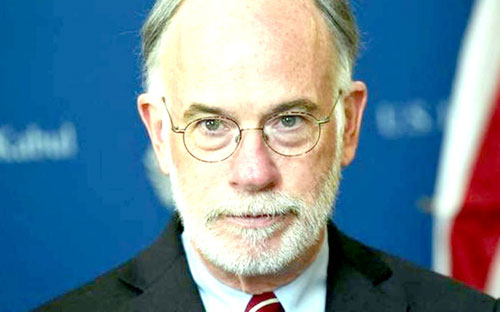While Russia-Ukraine war draws global attention, humanitarian crisis deepens in Afghanistan as the Islamic Emirate heightened restrictions on women’s rights, freedom of expression and civil liberties in the country.
The restrictions have plunged the nation into economic collapse, where the United Nation estimated 95 percent of the overall population suffering from hunger. Ross Wilson, the former acting US Ambassador to Afghanistan, discuses the Kabul now and then on a MPRnews report published April 13, 2022, overlooking with the current status of the country first.
“I think we had some hopes that there would be a consensual transfer of power from those who had led the Islamic Republic of Afghanistan that we helped to establish after our invasion in 2001, to something a little bit broader that included Taliban but was not dominated by the Taliban, and certainly not exclusively, the Taliban,” he said according to the report. Expressing surprise, Wilson said they were hopeful the so-called Islamic Emirate would rather rule “reasonably” this time, providing equal right to its citizen. There actions, however, proves they haven’t change much.
“…We had hopes that some in the United States and elsewhere, that the [Taliban] might rule more reasonably than they had in the 1990s, have proved not to have turned out,” he said. “Arguably, the Taliban have returned to who they were before.” When asked whether or not Wilson and his staff did their best to help Afghans under the circumstances, he said it was an “unprecedented accomplishment” though they are sad about what they have left behind.
“I think all of us who were there are incredibly proud of what we did — 124,000 people got out,” he exclaimed. “That movement was affected by our State Department staff, but obviously, especially by the thousands of military personnel who provided the security and directly supported that evacuation effort.” Now that world watches Russia’s ongoing invasion of Ukraine, Wilson says he is worried of what is happening in Afghanistan, saying “there are other need in the world, and they have to be addressed.
“I think it’s important for the United States both to work with and assist those who got out. Work with and assist those who, particularly those who worked for us and with us — as well as American citizens, of course — to help them get out,” he elaborated the need to not forgetting about Afghanistan’s situation. On Wednesday, the World Bank in a statement said that Afghanistan’s per capita income has fallen by around 1/3 during the fourth quarter of 2021, wiping country’s economic progress achieved since 2007. According to the statement, aid-depended services sectors have been affected by the ongoing political instability, leading to a collapse in urban employment and incomes.
“The political crisis has put the gains of around two decades in Afghanistan at risk and will lead the country to grave poverty,” the World Bank said. Meanwhile, officials of the Afghan Ministry of Economy said it has economic plans to avoid further damages and improve current economy. “To control the situation, the Ministry of Economy has strategic plan in which trade and transit are focused on,” said Abdul Latif Nazari, deputy ministry of economy, as local media quoted.
While the ministry lays out a promising plan to avoid further damages to the country’s economy, experts believe Afghanistan will face an “economic tragedy” if the condition continues the same. “The poverty, unemployment and humanitarian crisis will expand if the situation continues, and will gradually lose the basics of economy in Afghanistan, said Shabeer Basheeri, economic expert.
In August 15, 2021 the Taliban took control of Afghanistan, rolling back the foremost achievements of the post-2001 reconstruction efforts on overall growth of the country.—KP News










